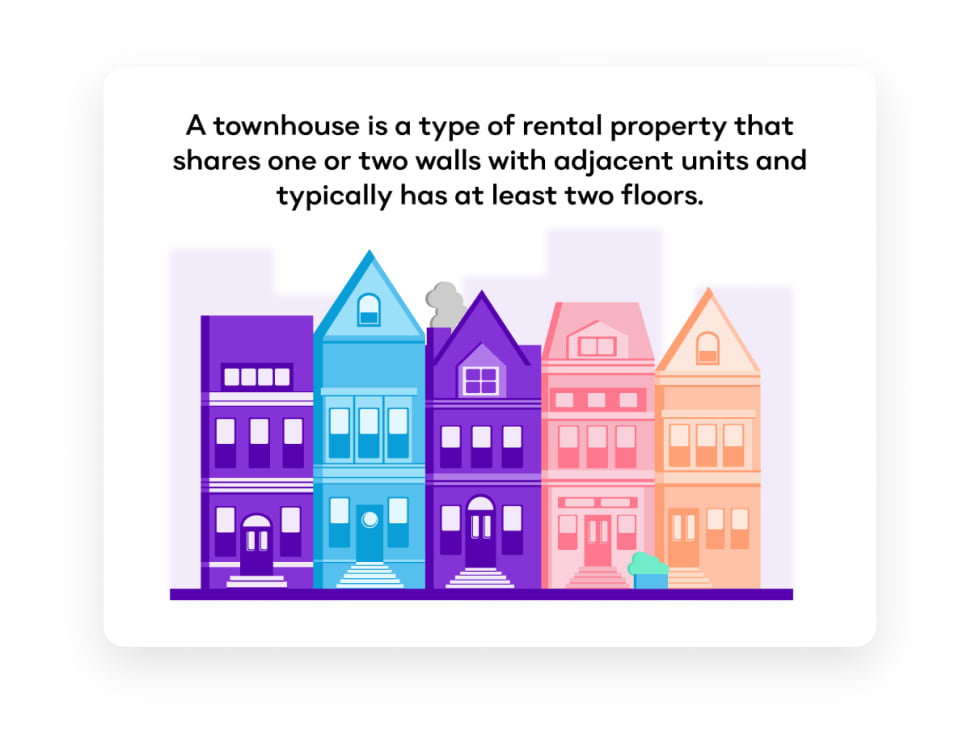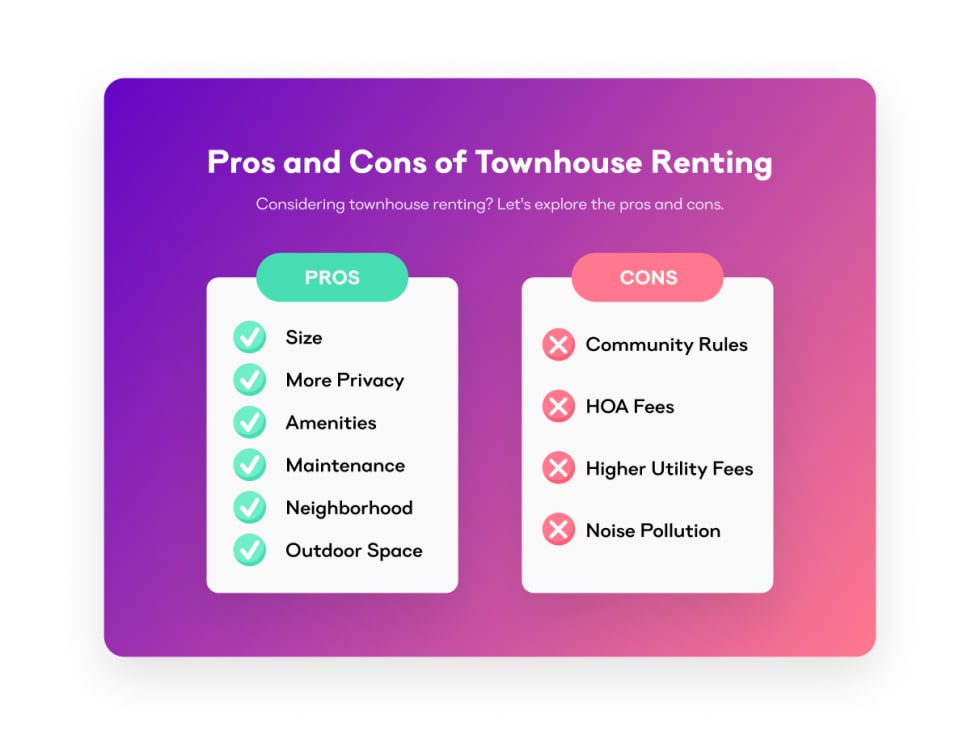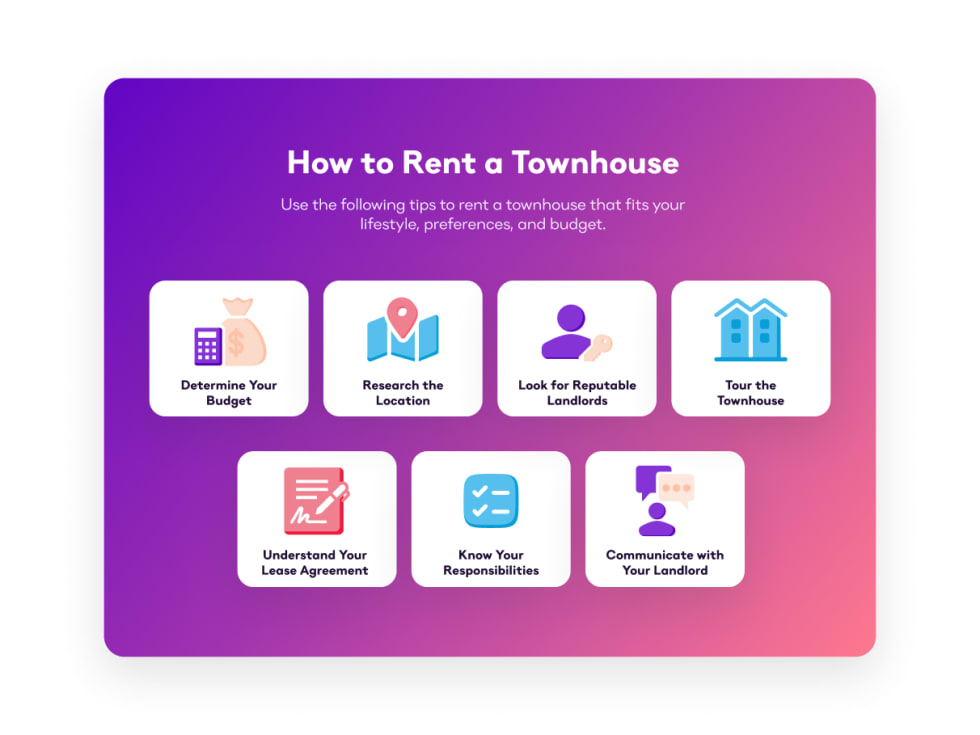- 47 units available
- 1 bed • 2 bed • 3 bed
- Amenities
In unit laundry, Hardwood floors, Dishwasher, 24hr maintenance, Stainless steel, Walk in closets + more

Are you thinking of renting an apartment soon, but feeling overwhelmed by the sheer number of options available? You may have heard about townhouses before and are wondering what they entail.
In this guide, we'll cover all aspects of townhouses so you can determine if it’s the right choice for your next rental property. From how they compare to different types of apartments, pros and cons of townhouse living, to tips to help you secure a unit. Let's dive in!
A townhouse is typically a multi-level rental unit that shares one or more walls with a neighbor. This layout offers renters something more like the experience of living in a house and tends to have a direct front entrance or even a patio.

A townhouse is a style of unit, and therefore can't be directly distinguished from condos. Indeed, the two typically share one or two walls and have an HOA that dictates much of what goes on in the community.
However, townhomes can either be part of apartment complexes or they can be purchased by an owner as an indepednent unit. However, townhomes do not have condo associations that they must pay dues to. That is primarily what sets townhouses and condos apart.
Townhouses can also be a kind of apartment in the sense that they can exist within an apartment complex. However, even when they're rented out, townhouses are usually referred to as such (and not as apartments). Whereas apartments tend to be laid out on a single floor, townhomes occupy multiple floors.
One of the major differences between townhouse living and apartment living has to do with your neighbors. In townhomes, you are less likely to have anyone above or below you, making noisy neighbors sometimes less of an issue than in a traditional apartment.
Before you ask how to rent a townhome, it’s important to weigh the benefits and pitfalls of this rental option.

While it’s easy to see the benefits of a townhouse, it’s still important to weigh through the downsides as well.
How do townhomes work? For some, all the community rules can feel too restricting, but for others who love structure and consistency, it can feel like the perfect home!
Ready to get yourself into a two-bedroom townhouse ASAP? Here are a few tips from the pros to help get you started on the right foot.

Much like you would with any rental property, you need to first start by determining what budget you’re working with. Next, consider your monthly costs, including your utilities, WiFi, cell phone, etc.
When looking at townhomes, keep an eye out for monthly HOA fees. Don’t let the appeal of a fancy townhouse community with a steep price tag lock you into a lease you can’t afford.
Always do your due diligence to research the location of a prospective rental property before committing to anything. Thankfully, townhomes have become increasingly popular in recent years, meaning most are in popular areas.
Regardless, research the location to ensure everything you need is nearby. For example, if you don’t have a car, you’ll need to ensure you can readily access grocery stores, gyms, etc., by foot or public transportation.
A lease agreement is a legally binding document. Because you should take this agreement very seriously, you always want to ensure you enter into the contract with a reputable landlord.
Ask family and friends to see if they know of any landlords of townhomes in the areas you’re looking for. Then, if you’re still stuck, let Apartment List help!
When you find a townhouse you like, always complete a walk-through before signing any paperwork. While we always recommend completing a walkthrough in person, there are some exceptions.
For example, if you’re moving across the country, it might not be feasible to inspect the townhouse first. If possible, ask a family member or friend to stand in on your behalf. Otherwise, be on the lookout for virtual tours. Or, ask your prospective landlord if that’s something they might be willing to offer via FaceTime, Zoom, or Skype.
Again, a lease agreement is a legally binding document. As such, you always want to ensure you read it thoroughly and understand everything. If you have any questions, contact your landlord for answers.
If your landlord is difficult to get answers from or makes you feel like a burden, chances are that’s a taste of what your landlord-renter relationship will look like. But, remember, it’s not too late to back out before you sign!
In reviewing your lease agreement, ensure you know your responsibilities as a renter. One of the primary responsibilities of all renters is to make monthly rent payments on time. The details of how much and how to pay monthly rent should be in your lease.
Beyond rent payments, you should also understand the move-in and move-out procedures and who to contact about maintenance requests, pet policies, and guest policies, to name a few.
Along with your responsibilities as a renter come your rights. As you enter the landlord-renter relationship, you are entitled to certain things too. To be sure of what these rights are, read up on the local laws in your area.
Some of the rights that can be dictated by local legislation include items such as notices to enter the property, late rent notices, lease violation notifications, etc.
Since you are entering into a business relationship with your landlord upon signing your lease agreement, it’s always important to open the lines of communication with them. In addition, know who to contact should any regular maintenance issues or emergencies arise on the property.
You want your landlord to feel comfortable enough to approach you with any questions or concerns just as much as you want to feel comfortable reaching out to them in time of need.
Now that you know how a townhouse is different from an apartment, you can decide if townhouse living is right for you. After all, it all boils down to personal preference!
And once you're officially ready to begin townhouse hunting, don't forget to take our quiz and start your search on Apartment List, where you'll find thousands of options tailored to your needs as a renter.
Townhomes always share at least one wall with a neighbor. If they were totally independent structures, they would just be called "houses."
Unfortunately, soundproofing will be entirely based on the individual construction of a townhouse building. However, if you own your townhome, you may be allowed to add additional soundproofing at your own expense.



In unit laundry, Hardwood floors, Dishwasher, 24hr maintenance, Stainless steel, Walk in closets + more
In unit laundry, Granite counters, Pet friendly, Stainless steel, Walk in closets, Gym + more